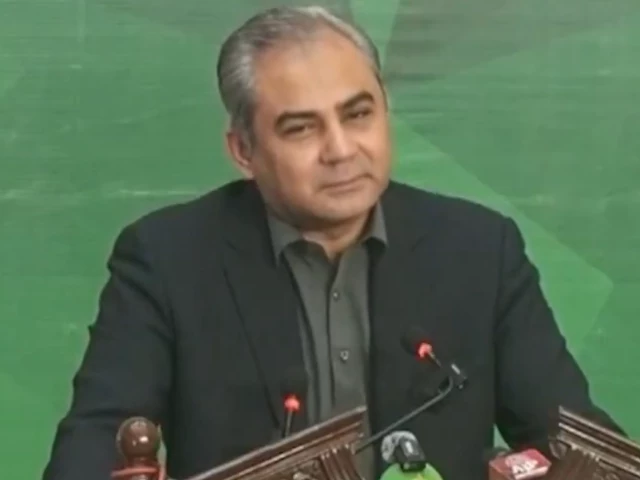The Minister of the Interior, Mohin Naqvi, congratulated Pakistan’s intelligence agencies on Sunday for their critical role during the recent conflict with India, claiming that they had early access to enemy plans and even obtained video sequences of six Indian planes slaughtered.
The recent confrontation between the two neighboring countries, triggered by the attack by Pahalgam, has marked one of the most serious escalations in decades, pushing the rivals with nuclear arms on the verge of large -scale war. The conflict led to civilian victims on both sides before diplomatic efforts managed to defuse tensions.
During the exchange, Pakistan Air Force killed six Indian planes, including a burst fighter of French manufacturing. A senior French intelligence official later confirmed the loss of at least one burst – marking the first known fight on the plane.
Also read: Monsoon rains trigger generalized floods through punjab
Speaking during a seminar organized by the foundation of Professor Waris Mir in Aiwan-E-IQBAL, Naqvi said: “The role of our intelligence agencies was so important … We knew everything they were planning, what aircraft they would use.” He added: “In a few minutes, we received video sequences from the six planes that were slaughtered.”
The Minister revealed that the intelligence agencies had received detailed information on the plans of India well in advance, in particular sensitive information and operational documents.
“We used to have all the details of the decisions and papers of India in advance. Later, when their plane was shot, it was decided that until we have evidence, we would not announce how many planes had been shot. We needed proof on the ground – and to believe me, in a few minutes, the evidence was with us.
Naqvi awarded part of the success of Pakistan during the conflict on divine intervention. “India pulled seven missiles on one of our large bases, which contained precious assets. Everyone was worried, but not a single missile landed inside the base-some fell before reaching, some outside and some side,” he said.
He added that when Pakistan retaliated, his missiles struck an Indian oil storage deposit without causing civilian victims. “It was purely the help of Allah,” he said.
He also praised the military leadership of Pakistan, in particular Marshal Syed Asim Murnir. Naqvi recalled a meeting with a Saudi delegation on a visit which included military and government representatives. The Marshal in the field, he said, said to them: “India is like a brilliant Mercedes, but we are like a truck of the dumper loaded with stones. Now imagine what is happening when the two collide. ”
Stressing the unique unity within Pakistan leaders, Naqvi said: “For the first time in the history of Pakistan, the Army, the Air Force and the Navy designed a joint strategy and fought the war in a single plan.” He contrasted this with the fracture of the command structure of India, where the military leaders would have operated independently.
Read: PM deploys ministers to supervise the relief of KP floods while the toll strikes 323
Naqvi also appointed Ajit Doval and Amit Shah as the real brains behind the climbing of the Indian government. “They are the two men behind all this, and they will drown India as well as Modi,” he warned.
He underlined internal political unity in the middle of the crisis: “On the side of Pakistan, all political parties united … Everyone was in contact and united.” According to Naqvi, the Pakistani leaders have surpassed the attempts of the Indian delegation to put pressure internationally, noting: “Our president of the PPP has exceeded them.”
The Minister also accused India of sponsoring terrorism in Pakistan, in particular in Balutchistan, and said that India had used war to suppress the cashmiris. He congratulated the resilience manifested by the Prime Minister and the national leaders to respond firmly, saying that they have challenged the pressure not to retaliate.
The seminar also presented the addresses of the President of the Senate, Syed Yusuf Raza Gillani, and the President of the Punjab Assembly, Malik Muhammad Ahmad Khan.




